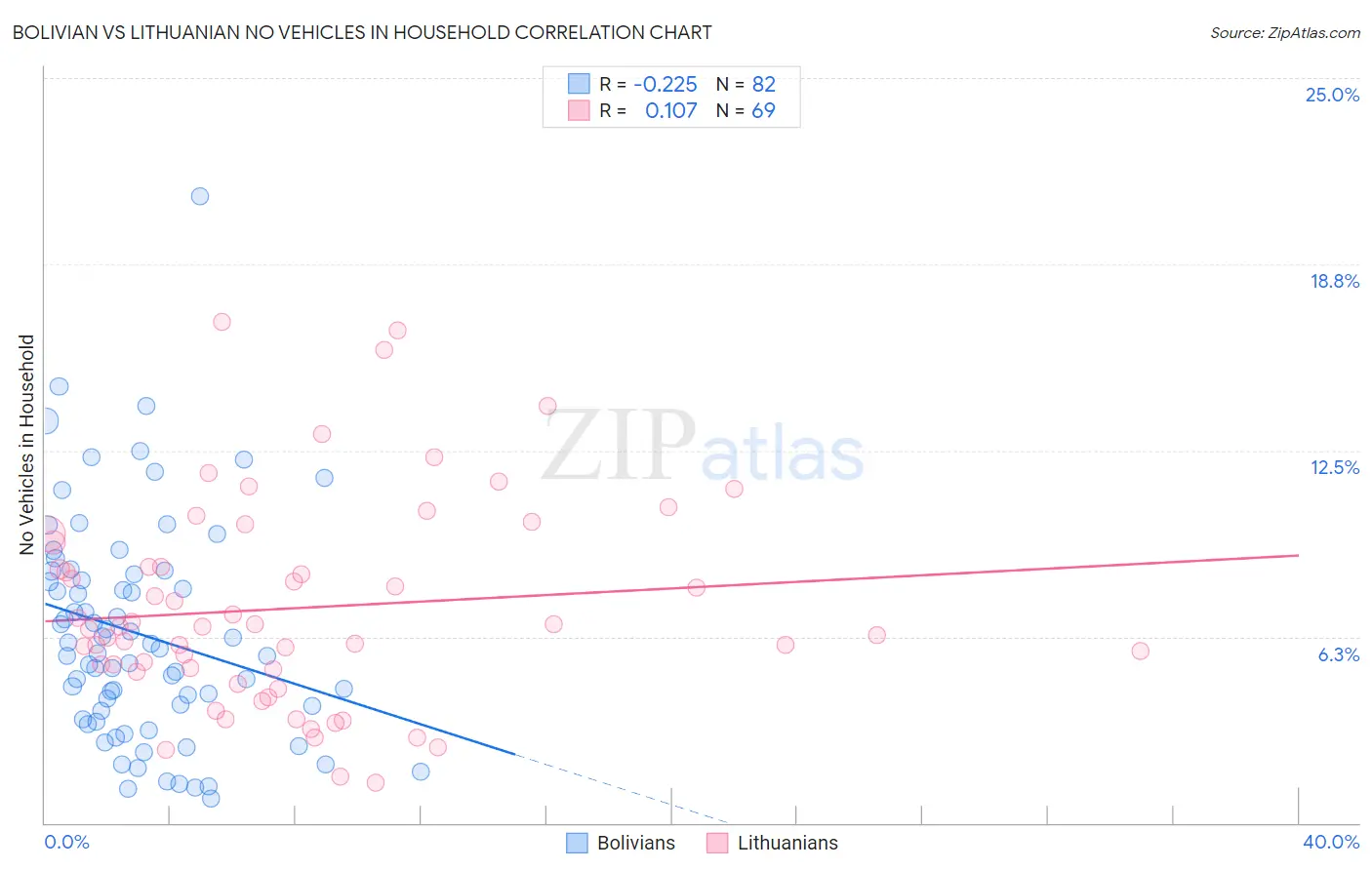Bolivian vs Lithuanian No Vehicles in Household
COMPARE
Bolivian
Lithuanian
No Vehicles in Household
No Vehicles in Household Comparison
Bolivians
Lithuanians
8.6%
NO VEHICLES IN HOUSEHOLD
99.4/ 100
METRIC RATING
80th/ 347
METRIC RANK
8.4%
NO VEHICLES IN HOUSEHOLD
99.6/ 100
METRIC RATING
72nd/ 347
METRIC RANK
Bolivian vs Lithuanian No Vehicles in Household Correlation Chart
The statistical analysis conducted on geographies consisting of 184,519,669 people shows a weak negative correlation between the proportion of Bolivians and percentage of households with no vehicle available in the United States with a correlation coefficient (R) of -0.225 and weighted average of 8.6%. Similarly, the statistical analysis conducted on geographies consisting of 420,405,245 people shows a poor positive correlation between the proportion of Lithuanians and percentage of households with no vehicle available in the United States with a correlation coefficient (R) of 0.107 and weighted average of 8.4%, a difference of 1.8%.

No Vehicles in Household Correlation Summary
| Measurement | Bolivian | Lithuanian |
| Minimum | 0.83% | 1.4% |
| Maximum | 21.0% | 16.8% |
| Range | 20.2% | 15.5% |
| Mean | 6.3% | 7.2% |
| Median | 5.8% | 6.6% |
| Interquartile 25% (IQ1) | 3.7% | 5.1% |
| Interquartile 75% (IQ3) | 8.4% | 9.0% |
| Interquartile Range (IQR) | 4.6% | 3.9% |
| Standard Deviation (Sample) | 3.7% | 3.5% |
| Standard Deviation (Population) | 3.7% | 3.4% |
Demographics Similar to Bolivians and Lithuanians by No Vehicles in Household
In terms of no vehicles in household, the demographic groups most similar to Bolivians are Tsimshian (8.6%, a difference of 0.050%), Portuguese (8.6%, a difference of 0.15%), Immigrants from South Eastern Asia (8.6%, a difference of 0.18%), Immigrants from South Central Asia (8.6%, a difference of 0.20%), and Iranian (8.6%, a difference of 0.32%). Similarly, the demographic groups most similar to Lithuanians are Immigrants from Lebanon (8.4%, a difference of 0.030%), Polish (8.4%, a difference of 0.030%), Cajun (8.4%, a difference of 0.060%), Spaniard (8.4%, a difference of 0.78%), and Immigrants from Iran (8.4%, a difference of 0.84%).
| Demographics | Rating | Rank | No Vehicles in Household |
| Palestinians | 99.7 /100 | #66 | Exceptional 8.3% |
| Immigrants | Scotland | 99.7 /100 | #67 | Exceptional 8.3% |
| Immigrants | Iran | 99.7 /100 | #68 | Exceptional 8.4% |
| Spaniards | 99.7 /100 | #69 | Exceptional 8.4% |
| Cajuns | 99.6 /100 | #70 | Exceptional 8.4% |
| Immigrants | Lebanon | 99.6 /100 | #71 | Exceptional 8.4% |
| Lithuanians | 99.6 /100 | #72 | Exceptional 8.4% |
| Poles | 99.6 /100 | #73 | Exceptional 8.4% |
| Cubans | 99.5 /100 | #74 | Exceptional 8.5% |
| Jordanians | 99.5 /100 | #75 | Exceptional 8.5% |
| Immigrants | Philippines | 99.5 /100 | #76 | Exceptional 8.5% |
| Iranians | 99.5 /100 | #77 | Exceptional 8.6% |
| Immigrants | South Central Asia | 99.5 /100 | #78 | Exceptional 8.6% |
| Portuguese | 99.5 /100 | #79 | Exceptional 8.6% |
| Bolivians | 99.4 /100 | #80 | Exceptional 8.6% |
| Tsimshian | 99.4 /100 | #81 | Exceptional 8.6% |
| Immigrants | South Eastern Asia | 99.4 /100 | #82 | Exceptional 8.6% |
| Italians | 99.4 /100 | #83 | Exceptional 8.6% |
| Immigrants | Jordan | 99.3 /100 | #84 | Exceptional 8.7% |
| Lebanese | 99.3 /100 | #85 | Exceptional 8.7% |
| Bangladeshis | 99.3 /100 | #86 | Exceptional 8.7% |